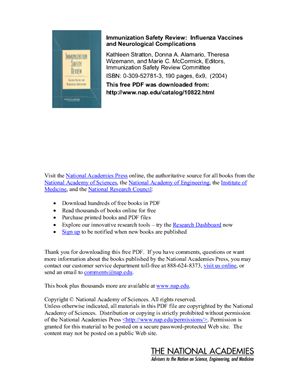Paperback: 190 pages
Publisher: National Academies Press (January 21, 2004)
Language: English
ISBN-10: 0309090865
ISBN-13: 978-0309090865
Product Description
Infection with the influenza virus can have a serious effect on the health of people of all ages, although it is particularly worrisome for infants, the elderly, and people with underlying heart or lung problems. A vaccine exists (the flu shot) that can greatly decrease the impact of influenza. Because the strains of virus that are expected to cause serious illness and death are slightly different every year, the vaccine is also slightly different every year and it must be given every year, unlike other vaccines. The Immunization Safety Review committee reviewed the data on influenza vaccine and neurological conditions, and concluded that the evidence favored rejection of a causal relationship between influenza vaccines and exacerbation of multiple sclerosis. For the other neurological conditions studied, the committee concluded the evidence about the effects of influenza vaccine is inadequate to accept or reject a causal relationship. The committee also reviewed theories on how the influenza vaccine could damage the nervous system. The evidence was at most weak that the vaccine could act in humans in ways that could lead to these neurological problems.
Book Description
Infection with the influenza virus can have a serious effect on the health of people of all ages, although it is particularly worrisome for infants, the elderly, and people with underlying heart or lung problems. A vaccine exists (the flu shot) that can greatly decrease the impact of influenza. Because the strains of virus that are expected to cause serious illness and death are slightly different every year, the vaccine is also slightly different every year and it must be given every year, unlike other vaccines.
The Immunization Safety Review committee reviewed the data on influenza vaccine and neurological conditions and concluded that the evidence favored rejection of a causal relationship between influenza vaccines and exacerbation of multiple sclerosis. For the other neurological conditions studied, the committee concluded the evidence about the effects of influenza vaccine is inadequate to accept or reject a causal relationship. The committee also reviewed theories on how the influenza vaccine could damage the nervous system. The evidence was at most weak that the vaccine could act in humans in ways that could lead to these neurological problems.
Contents
Executive Summary
Immunization Safety Review: Influenza Vaccines and Neurological Complications
The Charge to the Committee
The Study Process
The Framework for Scientific Assessment
Under Review: Influenza Vaccines and Neurological Complications
Scientific Assessment
Significance Assessment
Recommendations for Public Health Response
References
Appendix A
Appendix B
Appendix C
Appendix D
Publisher: National Academies Press (January 21, 2004)
Language: English
ISBN-10: 0309090865
ISBN-13: 978-0309090865
Product Description
Infection with the influenza virus can have a serious effect on the health of people of all ages, although it is particularly worrisome for infants, the elderly, and people with underlying heart or lung problems. A vaccine exists (the flu shot) that can greatly decrease the impact of influenza. Because the strains of virus that are expected to cause serious illness and death are slightly different every year, the vaccine is also slightly different every year and it must be given every year, unlike other vaccines. The Immunization Safety Review committee reviewed the data on influenza vaccine and neurological conditions, and concluded that the evidence favored rejection of a causal relationship between influenza vaccines and exacerbation of multiple sclerosis. For the other neurological conditions studied, the committee concluded the evidence about the effects of influenza vaccine is inadequate to accept or reject a causal relationship. The committee also reviewed theories on how the influenza vaccine could damage the nervous system. The evidence was at most weak that the vaccine could act in humans in ways that could lead to these neurological problems.
Book Description
Infection with the influenza virus can have a serious effect on the health of people of all ages, although it is particularly worrisome for infants, the elderly, and people with underlying heart or lung problems. A vaccine exists (the flu shot) that can greatly decrease the impact of influenza. Because the strains of virus that are expected to cause serious illness and death are slightly different every year, the vaccine is also slightly different every year and it must be given every year, unlike other vaccines.
The Immunization Safety Review committee reviewed the data on influenza vaccine and neurological conditions and concluded that the evidence favored rejection of a causal relationship between influenza vaccines and exacerbation of multiple sclerosis. For the other neurological conditions studied, the committee concluded the evidence about the effects of influenza vaccine is inadequate to accept or reject a causal relationship. The committee also reviewed theories on how the influenza vaccine could damage the nervous system. The evidence was at most weak that the vaccine could act in humans in ways that could lead to these neurological problems.
Contents
Executive Summary
Immunization Safety Review: Influenza Vaccines and Neurological Complications
The Charge to the Committee
The Study Process
The Framework for Scientific Assessment
Under Review: Influenza Vaccines and Neurological Complications
Scientific Assessment
Significance Assessment
Recommendations for Public Health Response
References
Appendix A
Appendix B
Appendix C
Appendix D

